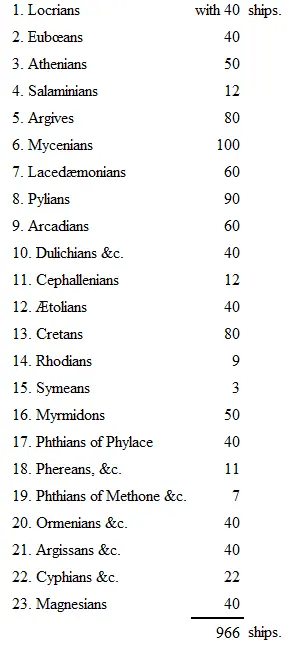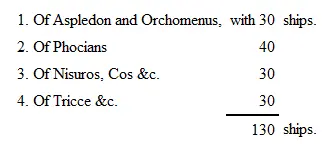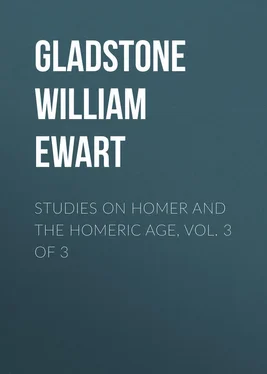William Gladstone - Studies on Homer and the Homeric Age, Vol. 3 of 3
Здесь есть возможность читать онлайн «William Gladstone - Studies on Homer and the Homeric Age, Vol. 3 of 3» — ознакомительный отрывок электронной книги совершенно бесплатно, а после прочтения отрывка купить полную версию. В некоторых случаях можно слушать аудио, скачать через торрент в формате fb2 и присутствует краткое содержание. Жанр: foreign_antique, foreign_prose, на английском языке. Описание произведения, (предисловие) а так же отзывы посетителей доступны на портале библиотеки ЛибКат.
- Название:Studies on Homer and the Homeric Age, Vol. 3 of 3
- Автор:
- Жанр:
- Год:неизвестен
- ISBN:нет данных
- Рейтинг книги:4 / 5. Голосов: 1
-
Избранное:Добавить в избранное
- Отзывы:
-
Ваша оценка:
- 80
- 1
- 2
- 3
- 4
- 5
Studies on Homer and the Homeric Age, Vol. 3 of 3: краткое содержание, описание и аннотация
Предлагаем к чтению аннотацию, описание, краткое содержание или предисловие (зависит от того, что написал сам автор книги «Studies on Homer and the Homeric Age, Vol. 3 of 3»). Если вы не нашли необходимую информацию о книге — напишите в комментариях, мы постараемся отыскать её.
Studies on Homer and the Homeric Age, Vol. 3 of 3 — читать онлайн ознакомительный отрывок
Ниже представлен текст книги, разбитый по страницам. Система сохранения места последней прочитанной страницы, позволяет с удобством читать онлайн бесплатно книгу «Studies on Homer and the Homeric Age, Vol. 3 of 3», без необходимости каждый раз заново искать на чём Вы остановились. Поставьте закладку, и сможете в любой момент перейти на страницу, на которой закончили чтение.
Интервал:
Закладка:
οὕνεκ’ ἄρ’ οὐχ ᾧ πατρὶ χαριζόμενος θεράπευον
δήμῳ ἔνι Τρώων, ἀλλ’ ἄλλων ἦρχον ἑταίρων 20 20 Od. xiii. 265.
.
So likewise in the youth of Nestor, two generations back, Augeias appears as the sole king of the Epeans; but, in the Catalogue, his grandson Polyxeinus only commands one out of the four Epean divisions of ten ships each, without any sign of superiority: of the other three, two are commanded by generals of the Actorid family, which in the earlier legend appears as part of the court or following of Augeias 21 21 Il. xi. 709, 39, 50.
. And wherever we find in the case of any considerable Greek contingent the chief command divided among persons other than brothers, we may probably infer that there had been a breaking up of the old monarchical and patriarchal system. This point deserves more particular inquiry.
Shown by analysis of the Catalogue.
In the Greek armament, there are twenty-nine contingents in all.
Of these, twenty-three are under a single head; with or without assistants who, where they appear, are described as having been secondary.

Under brothers united in command, there were four more contingents:

In all these cases, comprising the whole armament except from two states, the old form of government seems to have continued. The two exceptions are:
1. Bœotians; with 50 ships, under five leaders.
2. Elians; with 40 ships, under four leaders.
It is quite clear that these two divisions were acephalous. As to the Elians, because the Catalogue expressly divides the 40 ships into four squadrons, and places one under each leader, two of these being of the Actorid house, and a third descended from Augeias. As to the Bœotians, the Catalogue indicates the equality of the leaders by placing the five names in a series under the same category.
An indirect but rather strong confirmation is afforded by the passage in the Thirteenth Book 22 22 Il. xiii. 685-700.
, where five Greek races or divisions are engaged in the endeavour to repel Hector from the rampart. They are,
1. Bœotians.
2. Athenians (or Ionians), under Menestheus, seconded by Pheidas, Stichios, and Bias.
3. Locrians.
4. Epeans (of Dulichium &c.) under Meges, son of Phyleus, with Amphion, and Drakios. The addition of the patronymic to Meges seems in this place to mark his position; which is distinctly defined as the chief one in the Catalogue, by his being mentioned there alone.
5. Phthians, under Medon and Podarces. These supplied two contingents, numbered 17 and 19 respectively in the list just given; and they constituted separate commands, though of the same race.
It will be remarked that the Poet enumerates the commanders of the Athenians, Epeans, and Phthians; but not of the Locrians and Bœotians. Obviously, in the case of the Locrians, the reason is, that Oilean Ajax, a king and chief of the first rank, and a person familiar to us in every page, was their leader. Such a person he never mixes on equal terms with secondary commanders, or puts to secondary duties; and the text immediately proceeds to tell us he was with the Telamonian Ajax 23 23 Il. xiii. 701-8.
. But why does it not name the Bœotian leader? Probably, we may conjecture, because that force had no one commander in chief, but were an aggregation of independent bodies, whom ties of blood or neighbourhood drew together in the armament and in action.
Having thus endeavoured to mark the partial and small beginnings of disorganization in the ancient form of government, let us now observe the character of the particular spots where they are found. These districts by no means represent, in their physical characteristics, the average character of Greece. In the first place, they are both on the highway of the movement between North and South. In the second, they both are open and fertile countries; a distinction which, in certain local positions, at certain stages of society, not only does not favour the attainment of political power, but almost precludes its possession. The Elis of Homer is marked by two epithets having a direct reference to fertility of soil; it is ἱππόβοτος, horse-feeding, and it is also εὐρύχορος, wide-spaced or open. Again, the twenty-nine towns assigned in the Catalogue to the Bœotians far exceed in number those which are named for any other division of Greece. We have other parallel indications; such as the wealth of Orchomenos 24 24 Il. ix. 381.
; and of Orestius with the variegated girdle. He dwelt in Hyle, one of the twenty-nine, amidst other Bœotians who held a district of extreme fertility 25 25 Il. v. 707-10.
, μάλα πίονα δῆμον ἔχοντες. Now when we find signs like these in Homer, that Elis and Bœotia had been first subjected to revolution, not in the shape of mere change of dynasty, but in the decomposition, so to speak, of their ancient forms of monarchy, we must again call to mind that Thucydides 26 26 Thuc. i. 2.
, when he tells us that the best lands underwent the most frequent social changes by the successions of new inhabitants, names Bœotia, and ‘most of Peloponnesus’ as examples of the kind of district to which his remark applied.
Upon the whole, the organization of the armament for Troy shows us the ancient monarchical system intact in by far the greater part of Greece. But when we come to the Odyssey, we find increasing signs of serious changes; which doubtless were then preparing the way, by the overthrow of old dynasties, for the great Dorian invasion. And it is here worth while to remark a great difference. The mere supervention of one race upon another, the change from a Pelasgian to an Hellenic character, does not appear to have entailed alterations nearly so substantial in the character and stability of Hellenic government, as did the Trojan expedition; which, by depriving societies of their natural heads, and of the fighting men of the population, left an open field to the operation of disorganizing causes.
Strabo has a remarkable passage, though one in which he makes no particular reference to Homer, on the subject of the invasions and displacements of one race by another. These, he says 27 27 B. xii. 8, 4. p. 572.
, had indeed been known before the Trojan war: but it was immediately upon the close of the war, and then after that period, that they gained head: μάλιστα μὲν οὖν κατὰ τὰ Τρωικὰ, καὶ μετὰ ταῦτα, τὰς ἐφόδους γένεσθαι καὶ τὰς μεταναστάσεις συνέβη, τῶν τε βαρβάρων ἅμα καὶ τῶν Ἑλλήνων ὁρμῇ τινὶ χρησαμένων πρὸς τὴν τῶν ἀλλοτρίων κατάκτησιν. Of this the Odyssey affords some curious indications.
Extended signs in the Odyssey.
Among many alleged and some real shades of difference between the poems, we may note two of a considerable political significance: the word King in the Odyssey has acquired a more lax signification, and the word Queen , quite unknown to the Iliad, has come into free use.
Altered meaning of ‘King.’
It will be shown how strictly, in the Iliad, the term βασιλεὺς, with its appropriate epithets, is limited to the very first persons of the Greek armament. Now in the Odyssey there are but two States, with the organization of which we have occasion to become in any degree acquainted: one of them Scheria, the other Ithaca. Of the first we do not see a great deal, and the force of the example is diminished by the avowedly mythical or romantic character of the delineation: but the fact is worthy of note, that in Scheria we find there are twelve kings of the country, with Alcinous 28 28 Od. viii. 391. vi. 54.
, the thirteenth, as their superior and head. It is far more important and historically significant that, in the limited and comparatively poor dominions of Ulysses, there are now many kings. For Telemachus says 29 29 Od. i. 394.
,
Интервал:
Закладка:
Похожие книги на «Studies on Homer and the Homeric Age, Vol. 3 of 3»
Представляем Вашему вниманию похожие книги на «Studies on Homer and the Homeric Age, Vol. 3 of 3» списком для выбора. Мы отобрали схожую по названию и смыслу литературу в надежде предоставить читателям больше вариантов отыскать новые, интересные, ещё непрочитанные произведения.
Обсуждение, отзывы о книге «Studies on Homer and the Homeric Age, Vol. 3 of 3» и просто собственные мнения читателей. Оставьте ваши комментарии, напишите, что Вы думаете о произведении, его смысле или главных героях. Укажите что конкретно понравилось, а что нет, и почему Вы так считаете.












